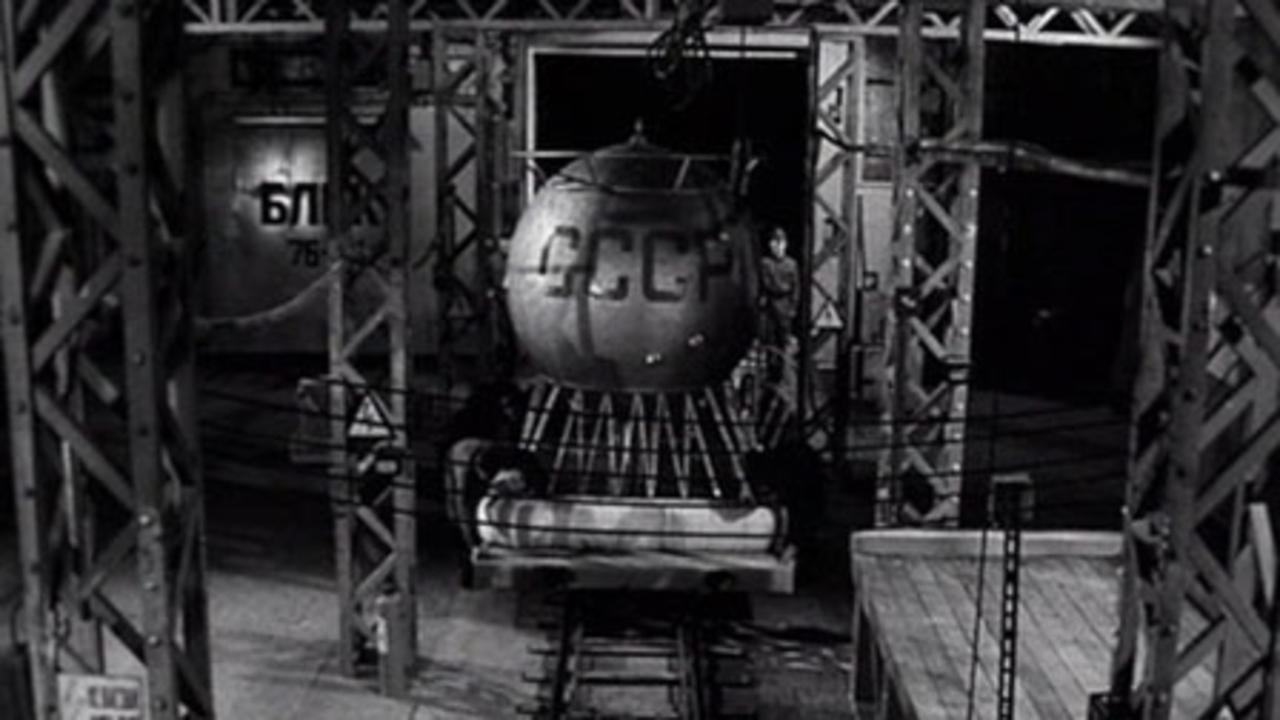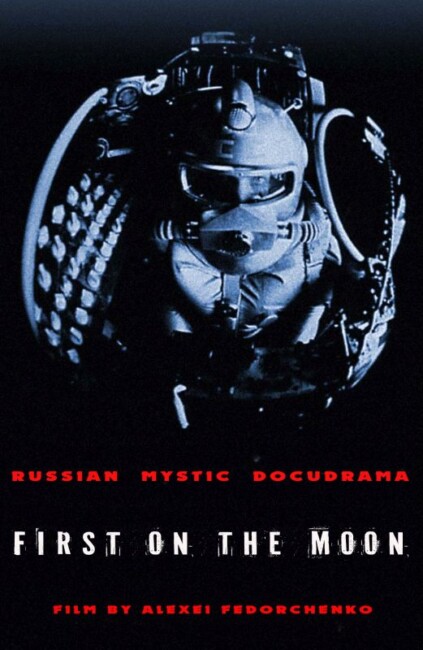(Pervye Na Lune)
Russia. 2005.
Crew
Director – Aleksey Fedorchenko, Screenplay – Aleksandr Gonorovsky & Ramil Yamaleyev, Producers – Mikhail Churbanov & Dimitri Vorobyov, Photography (b&w + colour) – Anatoly Lesnikov, Music – Sergei Sidelnikov. Production Company – SFC Films/Sverlovskaya Film Studio.
Cast
Boris Vlasov (Ivan Kharlamov), Anatoli Otradnov (Old Khanif Fattakhov), Viktoriya Ilyinskaya (Nadezhda Svetlaya), Viktor Kotov (Mikhail Roschin), Andrei Osipov (Fyodor Suprun), Aleksei Slavnin (Young Khanif)
Plot
A documentary about the attempts by the Soviet Union to launch a rocket to The Moon in 1938. The documentary uncovers the secretive recruitment of the two men, the woman and the dwarf who would become the astronauts, their training and the construction of the rocket. However, the rocket disappeared after it was launched. The failure of the mission was covered up the Soviet authorities. The documentary crew discover how the rocket came down and was seen as a fireball over remote Chile. They then track down what happened to the crew, in particular the mysterious fate of the pilot Ivan Kharmalov.
Soviet science-fiction cinema is a very different beast to American science-fiction cinema. While not as prolific, the Soviets had a strong output beginning with works like Aelita (1924) through Cosmic Voyage/The Space Ship (1936), scenes from which are screened here, and the heyday of the Space Age with films such as The Heavens Call (1959), Storm Planet (1962), Andromeda Nebula (1967) and Moscow-Cassiopeia (1973), and works from non-Russian countries such as First Spaceship on Venus (1959) and Ikarie XB-1/Voyage to the End of the Universe (1963). Many of these Soviet science-fiction films were brought up by Roger Corman and AIP and re-edited into titles like Battle Beyond the Sun (1963), Voyage to the Prehistoric Planet (1965), Queen of Blood (1966) and Voyage to the Planet of Prehistoric Women (1968). Most of these have themes about the bold exploration of space and/or taking the Communist message to the stars.
First on the Moon – not to be confused with the H.G. Wells novel The First Men in the Moon (1901) and the two film adaptations of it The First Men in the Moon (1964) and The First Men in the Moon (2010) – is the fascinating curio of a Soviet space exploration film that has been made a decade-and-a-half after the fall of the Soviet Union.
This makes First on the Moon surely the equivalent of films like Lobster Man from Mars (1989) or Sky Captain and the World of Tomorrow (2004) that are retro science-fiction films, homaging/spoofing the style and shortcomings of bygone science-fiction. In truth though, what First on the Moon resembles most is the Peter Jackson mockumentary Forgotten Silver (1995), which purported to uncover a forgotten alternate/secret history that revealed that somebody else made great discoveries first – in Jackson’s case it was the first film pioneer, here it is Soviets beating the Americans to the Moon by three decades.

The early scenes of First on the Moon replicate the look and style of Soviet propaganda documentaries with an uncanny conviction. Aleksey Fedorchenko gets the grainy blurred footage, the posed idealism, the period setting down near perfectly (and beautifully photographed to boot). Equally, the film manages to show the characters with an undeniable sense of deadpan humour – when the film decides to introduce a dwarf to the complement of astronauts you think it is heading in the direction of a farce like Jules Verne’s Rocket to the Moon/Those Fantastic Flying Fools (1967) but Aleksey Fedorchenko keeps the tone in admirable straight-face.
If this is the film that First on the Moon had remained, I would have given it a four star rating. Unfortunately, it abandons this approach. I thought the film might have taken us to The Moon and shown the Soviets exploring there but this is disappointingly not the case. In fact, the film shies away from any kind of venturing into space from the moment of the space launch – not unlike Jules Verne’s Rocket to the Moon. While the first half during the build up to the launch is an exceptional mimicry of the Soviet propaganda film, the second half takes the far less interesting path of following the documentary crew as they conduct a mock investigation into the fates of the astronauts and key players, taking a trip to various parts of the world and supposedly uncovering what happened to them.
Trailer here


